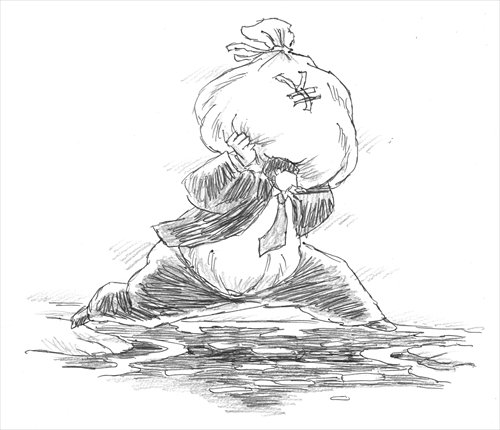China should continue to invest overseas

Illustration: Peter C. Espina/GT
In recent years, investment from domestic private enterprises has seen explosive growth. The proportion China's private enterprises represent in the stock of outbound investment rose from 19 percent in 2006 to 46.4 percent in 2014. During 2016's first quarter, private enterprises accounted for 68 percent of all mergers and acquisitions (M&As).
Continued jump in outbound investment has prompted both domestic and overseas concerns.
Domestic concerns largely come from the foreign exchange management authority, as the growth spurt of outbound investment has pushed up the demand of foreign exchanges from domestic enterprises. But China's foreign exchange reserves, which have declined by $800 billion since 2014, are facing tremendous pressure.
Under such circumstances, the foreign exchange management authority would naturally attribute the falling reserves to the rise in outbound investment, believing that encouraging foreign investment goes against the authority's policy goal of securing the foreign exchange reserves and preventing capital flight.
Meanwhile, China's rapid move in investing overseas has been doubted by international individuals. Although China is making efforts to enhance cooperation and investment, the country still lacks sufficient communication with overseas markets. Recent offshore investment has encountered protests from the US and some European countries, such as attempts to influence the advancement of the Belt and Road initiative.
The reason behind the rising foreign investment comes from businesses' desire to develop and to make breakthroughs.
First, domestic enterprises face operating pressure and rising costs. Even though they are positive about China's consumption demand, excessive and rapid increases in factor prices have overwhelmed potential space for development, according to certain enterprises.
Second, there is a well-established trend for the integration of industrial chain and cross-border asset restructuring, and this has served as a motive for domestic firms to purchase undervalued overseas assets and then strive for lofty valuations.
In addition, technology- and market-oriented M&As have become an investment target. Previously, firms mostly eyed resources-related foreign assets, but now they are shifting to multiple focuses, including gaining overseas market access, resources, technology, and distribution channels.
Of course, some domestic enterprises have taken advantage of regulatory cracks to conduct irregular, even illegal, operating activities. For instance, as a result of further administrative streamlining and reduced power in regulatory authorities, domestic enterprises' demand for overseas investment only requires relevant filings instead of waiting for approval. The regulatory system during and after the foreign investment process hasn't been fully established, and the State Administration of Foreign Exchange is having difficulty in identifying the authenticity of overseas investment, leading to a large volume of capital outflows via individual financial products or investment funds in the form of partnerships.
Part of this private enterprise overseas investment spree has been driven by necessity. Some rules in international trade have forced firms to conduct investment diversion, as the potential influence of some regional free trade agreements, such as the US-led Trans-Pacific Partnership (TPP), has already been reflected in the flows of established investment. For instance, some domestic clothing enterprises that mainly export to the US and Japan have sped up their investment in countries such as Vietnam, a TPP member country, to avoid difficulties caused by rules of origin.
Even though private firms are actively conducting overseas undertakings, there are still challenges. In particular, countries along the Belt and Road initiative are mainly developing economies, where investment involves risks regarding safety, policy directions, and exchange rates. Meanwhile, small and medium-sized firms often lack relevant experience in investing overseas and have little knowledge of the local legal system, investment environment, and folk culture, in addition to a shortage of professionals who can speak local languages, endure hardships and have technical expertise. This has left Chinese companies relatively weak in preventing and avoiding investment risks.
China's process of capital export still remains in its initial phase, and as the Chinese economy moves into a new normal and faces structural upgrading, domestic firms must participate and compete in the international markets.
In this regard, the government should stand firm on encouraging domestic enterprises to seek overseas opportunities, facilitate the implementation of the Belt and Road initiative, and promote prepared enterprises in allocating certain global resources and industrial chains to achieve an industrial upgrade.
Meanwhile, the government should strengthen the service system for outbound investment, including the construction of an information network, with government service laying the groundwork and intermediaries and large enterprises participating in it.
Furthermore, enhanced precautionary research is needed in outbound investment, and credit insurance institutions should be encouraged to develop. Improvement in the regulatory and statistical system for outbound investment is also needed to achieve effective supervision and regulation for the entire process.
Strategic deployment is needed in China's two-way investment, and more policies are needed to attract and utilize foreign investment. Additionally, the way relevant exchange rate reforms are conducted and the way the Chinese government communicates with the markets need to be properly handled, so as to fundamentally stabilize China's balance of international payments and yuan exchange rate expectation.
The author is chief economist with the International Cooperation Center of the National Development and Reform Commission. bizopinion@globaltimes.com.cn